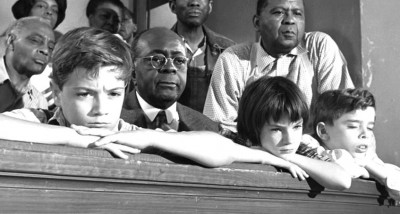
Robert Mulligan’s To Kill a Mockingbird (1962) is one of those movies that have become unassailable standards (TCM seems to run it every couple weeks) — and, no, I’m not about to assault it myself. Like the Harper Lee novel it’s adapted from, it’s every inch a finely-crafted, well-intended, thoughtful work — and apart from the fact both feel like something a grade school teacher would recommend to the brighter students (which is the fault of neither the book, nor the movie), I have nothing at all against them. I’ve simply never been able to get all that excited about them, especially Mulligan’s movie. Having just watched it for the first time in years for this review, I realized two things: It’s more exciting than I tend to allow, but, yes, it still feels kind of like an extra credit assignment to me. However, the only thing I can locate as a direct annoyance is when Elmer Bernstein’s score gets all Hollywood folksy — meaning it sounds like imitation Aaron Copland. The film itself is perfectly realized — and is like little else in Robert Mulligan’s filmography. The period, the locale and the mood are beautifully evoked. Plus, if you place the film in the context of its year — 1962 — it’s more daring than it feels 50 years later.

The great strength of the film is that it captures the book’s childhood point of view. These are all very adult events, but they’re adult events as seen from childhood. The film wisely make no issue of this. I’m not sure there’s even a single shot in it that attempts an actual children’s point of view, but it very carefully presents nothing that isn’t witnessed by either Scout (Mary Badham) or her brother Jem (Philip Alford). One or both of them are present in every scene (they’re really much more the stars than the adults), keeping what is experienced wholly on their level — or at least the level as remembered by the adult Scout (played in narration by an unbilled Kim Stanley). For this alone, the film is remarkable. What’s interesting about this from the point of Robert Mulligan is that he adopted much of the same approach nine years later — with older children — in Summer of ‘42, so someone clearly understood why Mockingbird worked as well as it does.
The Hendersonville Film Society will show To Kill a Mockingbird Sunday, April 14 at 2 p.m. in the Smoky Mountain Theater at Lake Pointe Landing Retirement Community (behind Epic Cinemas), 333 Thompson St., Hendersonville.



Before you comment
The comments section is here to provide a platform for civil dialogue on the issues we face together as a local community. Xpress is committed to offering this platform for all voices, but when the tone of the discussion gets nasty or strays off topic, we believe many people choose not to participate. Xpress editors are determined to moderate comments to ensure a constructive interchange is maintained. All comments judged not to be in keeping with the spirit of civil discourse will be removed and repeat violators will be banned. See here for our terms of service. Thank you for being part of this effort to promote respectful discussion.